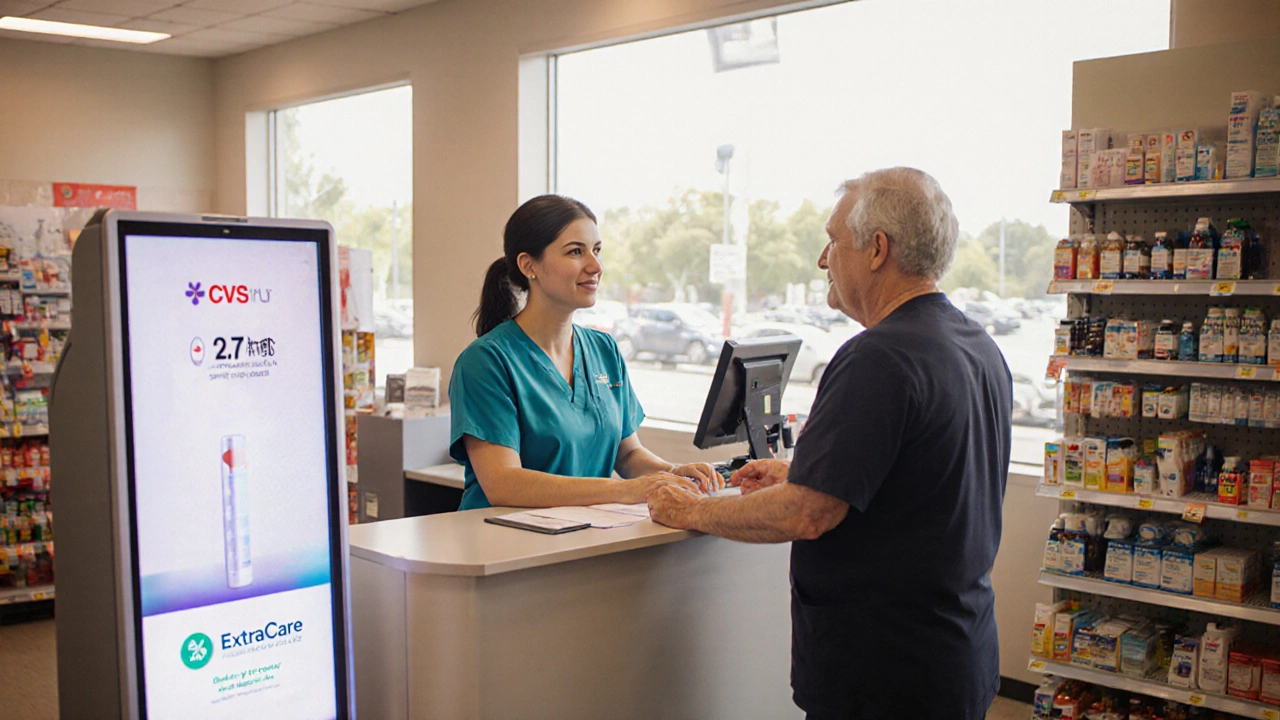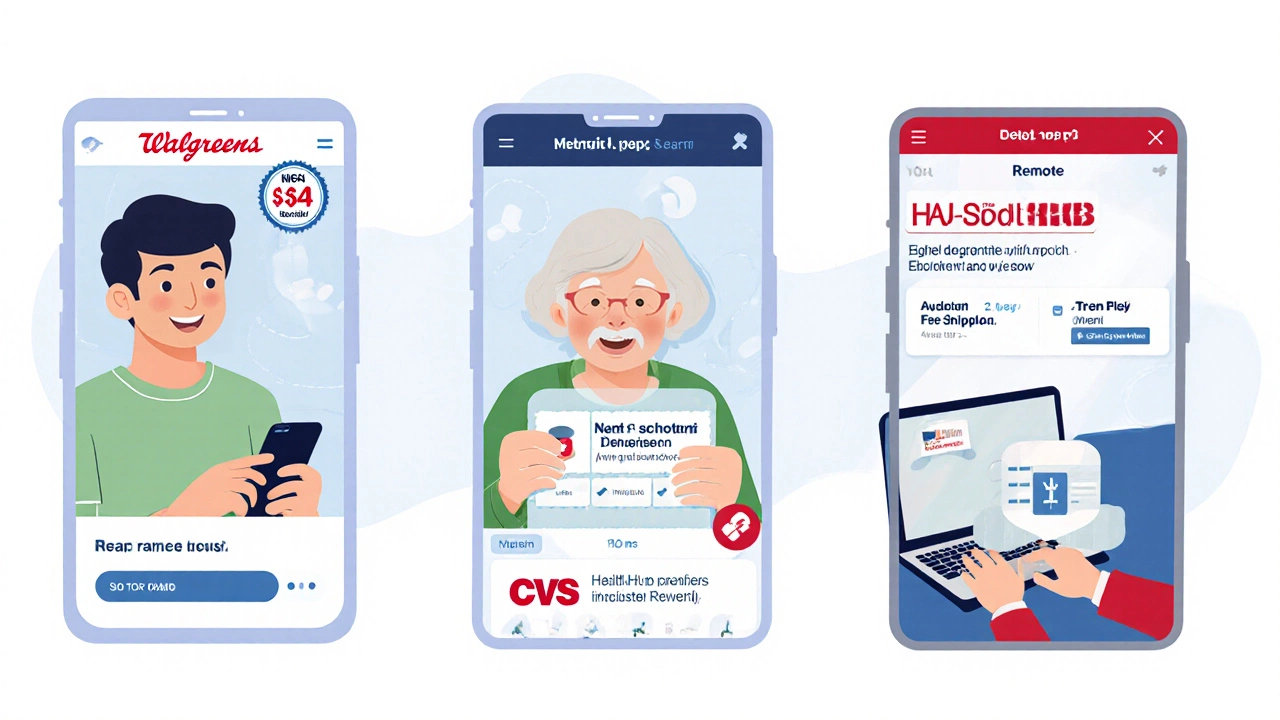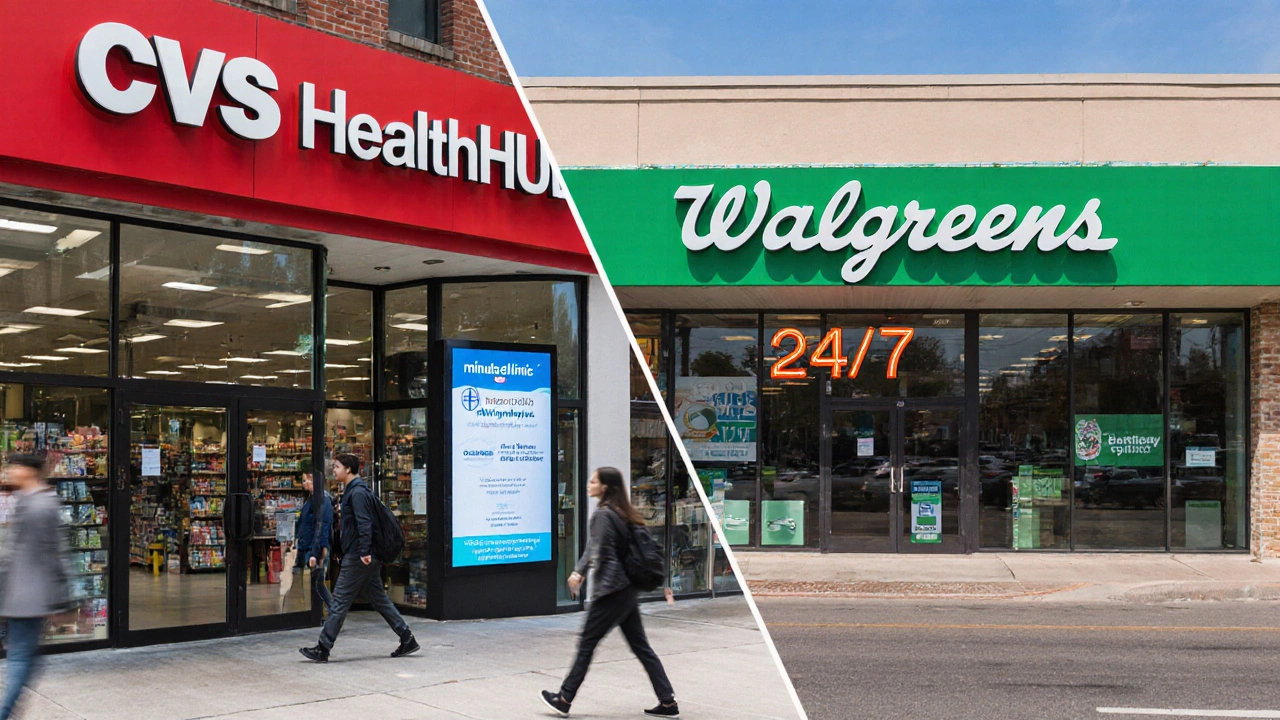CVS vs Walgreens Savings Calculator
Estimate Your Savings
Enter your prescription details to see which pharmacy offers the best value for your specific medications.
Estimated Savings
CVS Health
Generic Price: $13.00
Discount: $0.00
Loyalty Savings: $0.00
Total: $13.00
Walgreens
Generic Price: $12.00
Discount: $0.00
Loyalty Savings: $0.00
Total: $12.00
Recommendation
When you need a prescription filled, the decision often narrows down to two big names: CVS Health is a nationwide pharmacy chain that offers a blend of retail locations, health‑clinic services, and a digital app for managing meds. Founded in 1963, CVS operates over 9,800 stores and has expanded into primary‑care with its HealthHUB format. On the other side sits Walgreens the second‑largest U.S. pharmacy retailer, known for its extensive footprint and loyalty program called Balance Rewards.. Both promise convenience, competitive pricing, and extra perks, but which one actually delivers the best value for you?
What to Look for in a Modern Pharmacy
- Price Transparency: How clearly does the chain show generic vs brand pricing?
- Location & Hours: Are there 24/7 stores or nearby drive‑throughs?
- Loyalty & Discounts: Do they offer coupons, discount clubs, or point systems?
- Digital Experience: Mobile app features - refill reminders, telehealth, in‑store pickup.
- Additional Health Services: On‑site clinics, vaccination hubs, chronic‑care programs.
- Insurance Compatibility: Acceptance of major Pharmacy Benefits Managers (PBMs).
CVS Health - What It Brings to the Table
CVS has turned its retail footprint into a health‑focused destination. Its HealthHUB stores combine pharmacy, lab testing, and wellness products under one roof. The MinuteClinic offers walk‑in primary‑care for minor illnesses, vaccination, and chronic‑disease monitoring, all staffed by nurse practitioners.
On the savings side, CVS runs the ExtraCare loyalty program, which gives members 2% cash back on every purchase and exclusive coupons. The Prescription Savings Club offers a flat $5‑$15 discount on generics for non‑insured shoppers. Their mobile app lets you set up auto‑refill, track dosage, and even video‑chat with a pharmacist.
Walgreens - What Sets It Apart
Walgreens leans heavily on its Balance Rewards program, where points translate into $1 savings for every 250 points earned. The chain’s Healthcare Clinics (formerly Walgreens Pharmacy Clinics) provide basic urgent‑care services, flu shots, and health screenings.
Walgreens also runs the Prescription Savings Club (different from CVS’s) that caps generic prices at $4 for many high‑volume drugs. Their app includes a “Tap‑to‑Pay” feature, real‑time inventory checks, and integration with Amazon’s Alexa for voice‑activated refills.
Side‑by‑Side Comparison
| Feature | CVS Health | Walgreens |
|---|---|---|
| U.S. Store Count | ≈ 9,800 | ≈ 9,200 |
| 24/7 Locations | ≈ 1,200 | ≈ 1,500 |
| Loyalty Program | ExtraCare (2% cash back + coupons) | Balance Rewards (points → $1 per 250 pts) |
| Generic Discount Club | $5‑$15 off per generic (non‑insured) | Flat $4 generic cap (members) |
| On‑site Clinics | MinuteClinic (≈ 1,100 locations) | Healthcare Clinics (≈ 900 locations) |
| App Features | Auto‑refill, video pharmacist, pill‑reminder | Real‑time stock, Alexa voice refill, QR pay |
| Average Price (Lipitor 10 mg, 30‑day) | $48 (brand) / $13 (generic) | $48 (brand) / $12 (generic) |
| Insurance Acceptance | Most major PBMs (CVS Caremark, ExpressScripts) | Most major PBMs (Walgreens Pharmacy, OptumRx) |
| Customer Service Rating (US News 2025) | 4.2 / 5 | 4.0 / 5 |
Real‑World Scenarios: Who Benefits More?
Scenario 1 - The College Student: A student on a tight budget needs an antihistamine and a birth‑control pill each month. Walgreens’ $4 generic cap makes the antihistamine cheaper, while CVS’s ExtraCare cash‑back adds a modest boost on the birth‑control refill. If the student lives near a 24/7 Walgreens, that convenience outweighs CVS’s slightly higher cash‑back.
Scenario 2 - The Senior with Multiple Chronic meds: A 68‑year‑old on cholesterol, blood‑pressure, and diabetes meds values medication synchronization. CVS’s HealthHUB stores offer a “med‑sync” program and nurse‑practitioner follow‑ups, which can reduce trips. Walgreens’ Balance Rewards points accumulate quickly when the senior fills all scripts at the same location, turning points into future savings.
Scenario 3 - The Remote Worker: Someone who prefers home delivery benefits both chains’ mail‑order services, but CVS’s Auto‑refill plus free 2‑day shipping for members can be a game‑changer if the worker orders regularly. Walgreens, however, has a broader network of partner lockers for same‑day pickup, which is handy for last‑minute refills.

Pros & Cons at a Glance
- CVS Health - Pros
- Earn cash‑back instantly with ExtraCare.
- MinuteClinic offers extensive walk‑in care.
- HealthHUB format provides a one‑stop wellness hub.
- CVS Health - Cons
- Fewer 24/7 locations compared to Walgreens.
- Generic discount club requires membership fee for some plans.
- Walgreens - Pros
- More 24/7 stores, better for night‑time emergencies.
- Flat $4 generic price cap is easy to understand.
- Balance Rewards points can be redeemed for any in‑store purchase.
- Walgreens - Cons
- Loyalty points translate slowly to cash savings.
- Healthcare Clinics have fewer locations than MinuteClinics.
How to Choose the Right Pharmacy for You
- Map Your Needs. List the meds you take, how often you refill, and any extra services (vaccines, urgent care).
- Check Proximity. Use each chain’s store‑locator app to see which locations are within a 5‑mile radius.
- Crunch the Numbers. Look up the generic price of your most‑used drug on both websites. Add any loyalty cash‑back or point value.
- Consider Convenience. If you need 24/7 access or same‑day pickup, Walgreens may win. If you want a health hub with lab tests, CVS might be better.
- Sign Up for a Discount Club. Both chains have free membership tiers; enrolling can shave $5‑$10 off each refill.
Tips to Maximize Savings at Either Pharmacy
- Combine manufacturer coupons with store coupons - both CVS and Walgreens accept them.
- Use the “refill reminder” feature to avoid late fees.
- Take advantage of mail‑order for stable, long‑term prescriptions; it often reduces per‑pill price.
- Enroll in the chain’s credit card (CVS CareCredit, Walgreens Pay) for extra cash‑back during promotional periods.
- Ask the pharmacist about therapeutic alternatives that may be cheaper but equally effective.
Which pharmacy offers the cheapest generic drugs?
Walgreens’ $4 generic discount club usually beats CVS’s $5‑$15 off per generic, especially for high‑volume meds. However, CVS ExtraCare cash‑back can offset the difference if you shop there regularly.

Do both chains accept the same insurance plans?
Yes. Most major Pharmacy Benefits Managers (PBMs) like CVS Caremark, ExpressScripts, OptumRx, and UnitedHealthcare are accepted at both CVS and Walgreens. Always verify with your insurer for formulary specifics.
Is the CVS MinuteClinic really worth a visit?
For minor illnesses, vaccinations, and chronic‑disease monitoring, MinuteClinics provide quick, low‑cost care without an appointment. They’re especially handy if you already shop at CVS, saving a separate trip to a doctor’s office.
Can I earn rewards on both pharmacies simultaneously?
Absolutely. Enroll in ExtraCare for CVS and Balance Rewards for Walgreens. Points and cash‑back are tracked separately, so you can stack benefits if you split prescriptions between the two chains.
Which pharmacy has better mobile‑app features?
CVS’s app excels at video pharmacist consults and pill‑reminder alerts, while Walgreens shines with real‑time inventory checks and Alexa voice‑refill. Your preference depends on whether you value telehealth or instant stock visibility.









